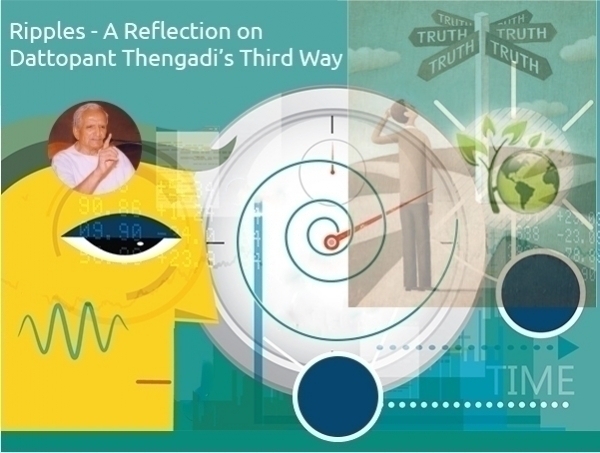Ripples A Reflection On Dattopant Thengadi's Third Way Part 56: On Revolution II
Dattopant observes that many of these points were not paid attention to, by violent revolutions. And many initially successful revolutions turned into authoritarian regime.
Total Views |
I have been reflecting in my own way on Dattopant Thengadi Ji's Third Way. I present these small "ripples" that it has caused in my mind in a series. I am glad it has found its resonance in many thinking minds alike. I hope the readers have read the earlier article in the series before moving ahead.

Also Read: Ripples A Reflection On Dattopant Thengadi's Third Way Part 55
(On Revolution- The paper submitted at a meeting of the National Executive of Bharatiya Majdoor Sangh in 1976)
About the Naxalite movement in our country 'Economic and Political Weekly' ( 22 July 1972) observed that symptoms of discontent were misinterpreted, and proper education of new recruits was ignored. Many anti-social elements entered the movement that had no ideological basis. Probably no shortcut is available for revolutions. This underlines the importance of mass participation and popular support.
On the other hand when Irish revolutionaries won the support of the entire population and they could mobilise the world opinion in their favour, the revolution succeeded.
Popular sympathy works wonders.
No power can maintain itself by making war on the entire population. When this stage is reached no power can continue for long. Of course arms too play a role though not a completely decisive role.
Mobilisation of popular support against foreign rulers is to an extent easier than fighting the Swadeshi establishment.
Propaganda is a tool that helps in securing popular support but doesn't add to the cadre base. Mass education helps in this. When one order or system is destroyed and a new order is to be constructed, mass education is essential in this endeavor. Education makes people equal partners, it is not one-way traffic like propaganda. There is direct and constant interaction between the leaders and the people. It is in a way a process of joint thinking.
The needs of the people are to be addressed and at the same time the needs people are not really aware of, are to be patiently brought to the discussion. Gradually people develop trust in the leadership, idealism is absorbed. This is a slow but continuous process, general literacy and political consciousness also have a role in this process.
Revolutionary Leaders should not view people as means, people develop great faith in the leaders who are ready to sacrifice and love people. Obviously, love cannot be manipulated. When both act 'in unshakeable solidarity ' the things move. The leaders need to be 'humble, loving, and courageous'. They educate and organise people.
Revolutionary leaders need to have faith in people's wisdom, people should be trusted. Dialogue is essential, it differentiates revolutions from the military coup. Leaders should not be misguided about their role and relationship with the people.
(Many of the points are explained by a thinker, Frier, but hardly any information could be made available about the writings. His writing is refered to by Dattopant)
Dattopant observes that many of these points were not paid attention to, by violent revolutions. And many initially successful revolutions turned into authoritarian regime. This is the reason ,non- violent revolutionaries criticised violent revolutions.
The method adopted by non- violent revolutionaries are different. The continuous dialogue is their major strength of successful leaders and their movements.


